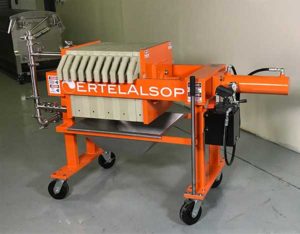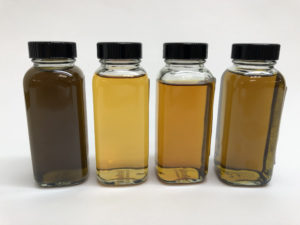Oil Extract from Hemp Using a Recessed Chamber Filter Press
How to Maximize Hemp Extract Quality and Consistency Using the Right Equipment
Only a reliable, clean, CBD oil product can be used for various medical and therapeutic applications relevant to today’s growing market. Serious manufacturers take the steps necessary to ensure that their CBD product is consistently free of plant particles, fats, lipids, debris, wax, and other contamination.
Professional producers of medical-grade cannabinoid products such as CBD oil turn to ErtelAlsop’s precision equipment to achieve excellence in every aspect of their liquid product, including taste, smell, and a consistent, polished appearance.
When it comes to equipment for CBD oil extraction from hemp, proper filtration removes large amounts of solvent and unwanted plant debris.
How to determine the best equipment for your CBD oil filtration process application:
| FILTRATION PROCESS APPLICATION | RECOMMENDED EQUIPMENT | RECOMMENDED PUMP |
|---|---|---|
|
Recessed Chamber Filter Press | Air-Operated Double Diaphragm Pumps, Screw Pumps |
|
Depth Filter Media, Plate and Frame Presses, and Lenticular Filters | Positive Displacement Gear Pump, Centrifugal Pump (Air Motor or Explosion Proof Electric Motor) |
CBD and cannabis oil extraction may involve various filtration processes depending on individual methods.
ErtelAlsop’s Recessed Chamber Filter Press is the best equipment to:
- Separate ethanol from biomass
- Separate lipids, fats & waxes from ethanol, post CO₂ or BHO winterization
- Remove loose activated carbon, filter aids, and other adsorbents from crude oil
Using a Recessed Chamber Filter Press for CBD Oil Production
 Following the extraction of CBD from hemp, filtration is the next step in the production process.
Following the extraction of CBD from hemp, filtration is the next step in the production process.
A filter press separates the biomass from the solvent (like ethanol) and removes plant lipids and wax after winterization. A filter press may also remove loose filter aids and adsorbents after purification.
A recessed chamber filter press is the best piece of equipment you can use to ensure efficient separation of solvent and extract from hemp plant particulates. The dewatering filter press in particular has the most efficient means of liquid solid separation through pressure filtration.
How A Filter Press Separates Ethanol from Biomass:
The ethanol and biomass slurry is pumped into the recessed chambers, where biomass accumulates on the filter cloth. The high compaction pressure compresses and dewaters the biomass. The ethanol crude passes through the filter cloth. The filter cloth retains the biomass which forms a filter cake.
Pre-coat and body feed are two similar filtration-assist methods that can go hand-in-hand or can be used separately, depending on the application. These methods are used when the solids in a slurry are extremely fine or gelatinous and there is a risk of blinding off the media (blocking off the filter cloth pores by trapped particles) and/or blinding off the slurry itself, both of which significantly restrict the flow rate. Both methods use the same filter aids.
Pre-coating helps to retain fine solids that otherwise could flow through the filter cloth. Body Feed keeps the slurry flowing and prevents it from blinding itself off. Adding highly porous DE creates a more permeable filter cake, which prevents blockage, and allows the solution to flow freely through the media.
Pre-Coat Method
When using the pre-coat method, filter aids such as diatomaceous earth (DE), cellulose, perlite, or fly ash are pre-mixed with the process carrier solution like ethanol, and pumped from a separate tank to pre-coat the filter cloth before the process slurry is pumped into the press.
Body Feed Method
When using the body feed method, these same filter aids are added to the process stream from a separate tank while the slurry is pumped into the press. The difference between pre-coat and body feed is that with body feed, the filter aid(s) are continuously pumped in for the duration of the filtration process.
These filter aids allow for higher flow rates, increased clarity, smoother polish filtration, more consistent runs, shorter cycles, drier filter cakes, and easier cake release.
Learn more about pre-coat and body feed methods.
EA Series Recessed Chamber Filter Press Technical Specifications
Materials and Temperature
ErtelAlsop uses nonporous, food grade copolymer polypropylene material for our standard recessed chamber plates. This material is stronger than standard polypropylene with a brittle point of -7°C (vs. 5°C for standard), but processors still need to use a batch process. A single batch process can be as cold as -40°C, but it should only be run once per 8-hour shift to allow for a warmup period between batches. Therefore, ErtelAlsop sizes the filter press considering such winterization and batch process requirements. Stainless steel, Kynar, and other materials are also available to withstand continuous cold temperatures associated with winterized ethanol slurries, and can be run continuously without warmup periods.
Filter Press Size Range
The EA Series of recessed chamber filter presses are designed to filter solids ranging from 0.01 cubic foot to 350 cubic feet. The plates range in size from 102mm to 1500mm. The filter press size that will work best for your application is determined by the volume of solids you need to process in a batch during an 8-hour shift.
Explore some of our Recessed Chamber Filter Press solutions for CBD extract and hemp oil production.
- EA 102 & EA 203 Lab Filter Press
- EA 470 & EA 630 Dewatering Filter Press
- EA 800 & EA 1000 Recessed Chamber Filter Press
- EA 1200 & EA 1500 Recessed Chamber Filter Press
Not sure which one is right for you? We can help you find the right equipment for your cannabinoid extract process for applications like edibles, medical marijuana, and CBD oil. Ask about our product filtration testing at your facility through our network of distributors or at our in-house lab.
Removal of solids is only one step in the CBD and Cannabinoid extract filtration process. Want to learn more about how filtration is involved in the CO₂ or cold ethanol extraction processes?

